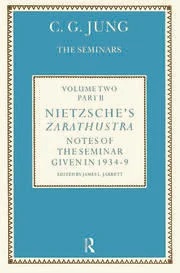C.G. Jung

C. G. Jung (1875 - 1961) was a Swiss psychiatrist, innovative thinker and founder of Analytical Psychology, whose most influential ideas include the concept of psychological archetypes, the collective unconscious, and synchronicity. He is the author of numerous works, including Memories, Dreams, Reflections and Man and His Symbols.
On Theology and Psychology: The Correspondence of C. G. Jung and Adolf Keller
'This book collects highlights from the fifty-year correspondence between C. G. Jung (1875- 1961) and his friend Adolf Keller (1872-1963), a celebrated Swiss theologian who was one of the founders of... (more)
The Earth has a Soul: The Nature Writings of C.G.Jung
Psychologist Meredith Sabini introduces a collection of Carl Jung's writings on the subject of nature. Jung asserts that society's loss of connection with nature has severed its link with the earthy,... (more)
The Archetypes and the Collective Unconscious (Collected Works: Vol. 9 Part 1)
The concept of "archetypes" and the hypothesis of "a collective unconscious" are two of Jung's better known ideas. In this volume, taken from the Collected Works, Jung describes and elaborates the... (more)
Visions: Notes on the Seminar Given in 1930-1934 - Edited by Claire Douglas (2 Volumes)
Jung taught 28-year old Christiana Morgan the trance-like technique of active imagination, helping her embark on a series of archetypal adventures which she depicted in paintings and he recounted his... (more)
Nietzsche's Zarathustra: Part 1 Notes of the Seminar given 1934-1939
An examination of one of the major philosophical influences on Jung that also provides a case study in Jungian psychology. (more)
Nietzsche's Zarathustra: Part 2 Notes of the Seminar given 1934-1939
These volumes, the transcript of a previously unpublished private seminar, reveal the fruits of Jung's early fascination with tales of Nietzsche's brilliance, eccentricity, and eventual decline into... (more)
Four Archetypes
The concept of the archetype is crucial to Jung's radical interpretation of the human mind. Here he considers the archetypes he regarded as fundamental to every living individual: mother, rebirth,... (more)
The Red Book: A Reader's Edition
The Red Book (catalogue number 29085), published to wide acclaim in 2009, contains the nucleus of C.G. Jung's later works. It was here that he developed his theories that would transform... (more)
The Zofingia Lectures: Collected Works Supplementary Volume 'A'
The Zofingia Club was a discussion group to which C.G. Jung belonged as a medical student: in 1897 he became Chairman, and gave five lectures. These have survived and are published here in a... (more)
Psychological Types
Psychological Types is one of Jung's most important and famous works. First published by Routledge in the early 1920s it appeared after Jung's so-called fallow period, during which he published... (more)
Analytical Psychology: Notes of the Seminar Given in 1925 by C.G. Jung
In 1925 Jung gave the first of his formal seminars in English. Beginning with a notable personal discussion of his break with Freud the seminars move on to discuss the collective unconscious,... (more)
The Freud/Jung Letters: Complete Edition
The complete letters between Freud and Jung, discussing colleagues, strategies for advancing psychoanalysis, and their ultimate split.
Jung on Alchemy
Presents a selection of Jung's writing on alchemy, a concise introduction to its principles and the importance of alchemy in the context of analytical psychology and the relevance of its symbolism to... (more)
Jung on Evil
This text brings together a key selection of Jung's writings on evil, a subject that became a central issue for him as he got older, to provide an accessible account of his thoughts on the subject,... (more)
Jung on Active Imagination
This work contains a selection of Jung's key writings on active imagination, showing how he developed the method over many years and came to realise its importance for achieving both self-knowledge... (more)
Answer to Job
Jung addresses the problem of how a good god can countenance the appalling evil apparent in the world. (more)
Modern Man in Search of a Soul
New edition in the 'Routledge Classics' series. 250 pages. (more)
Jung on Synchronicity and the Paranormal
Brings together a selection of Jung's work on the paranormal and synchronicity, from well known and less accessible sources. In a searching introduction the editor addresses all the main aspects of... (more)
Development of the Personality (Collected Works: Vol. 17)
Though Jung's main researches have centred on the subject of individuation as an adult ideal, he has a unique contribution to make to the psychology of childhood. Jung repeatedly underlined the... (more)
Dream Analysis: Notes on the Seminar Given in 1928-30 (Part 1)
This seminar was given at a series of weekly meetings, and was based on the dreams of one of Jung's male patients. It contains a storehouse of dream interpretation by Jung himself.
The Practice of Psychotherapy (Collected Works: Vol. 16)
The Practice of Psychotherapy brings together Jung's essays on general questions of analytic therapy and dream analysis. It also contains his profoundly interesting parallel between the transference... (more)






























